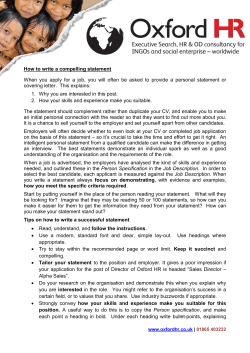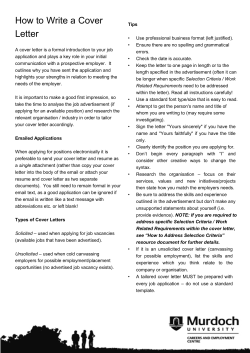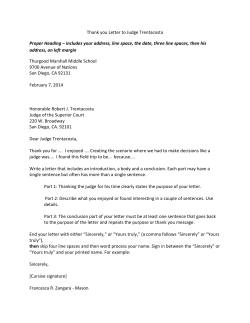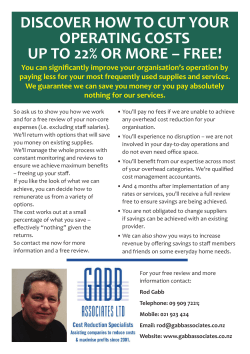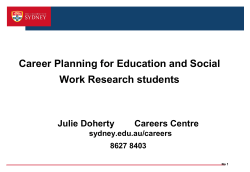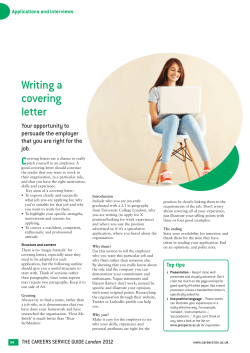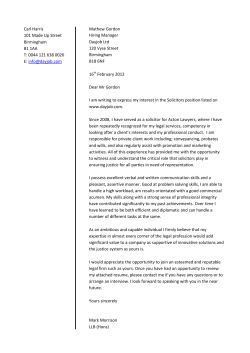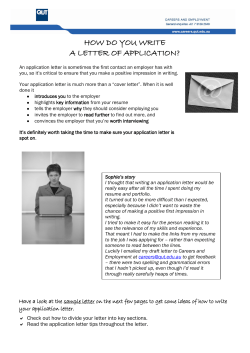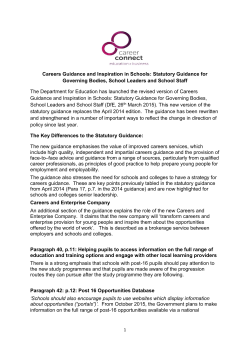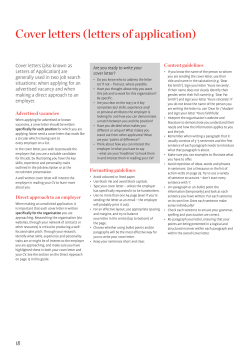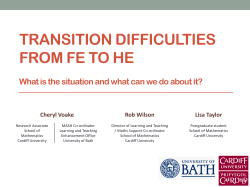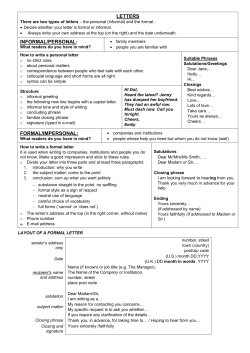
How to write a covering letter
How to write a covering letter If you are sending your CV to apply for a job, always include a cover letter. This is where you demonstrate your motivation and ability to do the job, and is your chance to really sell youreslf to the employer. A CV gives an overview of your skills and experience and the covering letter explains how these are relevant to the job and also shows your enthusaism for the particular role and organisation. To convince the reader that you meet their specific requirements, you will need to write a different letter for each organisation and position that you apply to. 1 Greetings Try to find a name as it sounds more personal and can show you have done some research about the company. If the job advertisement does not specify a name it is worth contacting the company to ask the name and the title of the person you should address the letter to. 3 4 Why you? 2 Introduction The first paragraph needs to be very clear. Include who you are (e.g. current 2nd year biomedical science student at Queen Mary, University of London), why you are writing (to apply for X position / looking for work experience) and where you saw the position advertised. Why them? Tell the employer why you want this job with their organisation - show your motivation and enthusiasm. Demonstrate that you understand what the job involves and that you have researched their organisation and industry. Avoid vague statements and obvious flattery. Be specific and illustrate your opinions with examples. Really emphasise why you are just right for this job, in terms of skills, experience and character. Illustrate your unique selling points with 3 or 4 excellent examples, rather than try to cover everything. Focus on the particular skills and experience the organisation want, using their recruitment information to find this. Use positive language and action words such as ‘succeeded in’, ‘initiated’. This is also the chance to deal directly and positively with any gaps or weaknesses in your CV. 5 The ending Your closing paragraph is an opportunity to restate your interest and summarise your suitability. It is also a good place to state your availability for interview and to end on an optimistic note. Make sure you sign off in the correct way: ‘Yours sincerely’ if addressed to a particular person, ‘Yours faithfully’ if you use Dear Sir / Madam. On the following page is an example cover letter matching the CV and job description in the CV leaflet Ms R. Drebb Long Hart School 32 White Hill London SW8 3SY Becky Graham 14 Gravel Road,London E1 4SK Use formal business B_graham@hotmail.co.uk letter layout 07390045678 Include the job title and reference number if there is one. 4th November 2012 Dear Ms. Drebb, I am writing to apply for the role of SEN teaching assistant, as advertised on QM JobOnline in November. I have enjoyed working with children since the sixth form when I first began to teach drama to teenagers during holiday workshops. Through my study of Psychology at University and voluntary work with autistic children, it has become clear to me that I want to make a positive impact upon the education of those with Special Educational Needs. I believe that my academic studies and work experience have provided me with the technical and theoretical skills to provide strong teaching assistance to excluded EBD pupils. After attending a Careers lecture where I heard an Educational Psychologist from Harringay Council talk about their job and the type of person who suits the role, I decided that this was my desired long-term career goal. Working as a classroom assistant will help me develop the skills required for this role. Over the past three years a variety of experience has given me the skills required for the challenge of working with EBD pupils as a classroom assistant. As a quick learner I scored one of the highest marks in my year at University for Social and Developmental Psychology and through teaching autistic children gardening skills in the NAS Gardening Project I gained an understanding of the challenges that SEN children face each day. I also learned to communicate instructions clearly in order to successfully deliver information to childrenwith mixed abilities. As a peer study mentor at University I improved my interpersonal skills by listening to the concerns of new students and supporting their studies as they made the transition from school to a higher education setting. I am impressed with the mission statement of Long Hart School and its aim to raise the educational and developmental expectations of its pupils and their parents. It is one of the few schools for excluded children within London that has forged links with local businesses, industry and organisations such as H.M. Armed Forces to help pupils progress into employment. As I believe that a motivational approach can improve the learning outcomes for SEN pupils I am most keen to join your school. I am available for interview at any time and look forward to hearing from you soon. Your sincerely This addresses ‘why this job’? The answer outlines actions taken to demonstrate motivation to work in the role This paragraph focuses on skills she can offer. She selects 3 requirements from the job description, and address them through detailed examples. The last section answers ‘why this particular school’? She uses specific things about the school and explains why they appeal and connect with her own interests/ experience. Sign off ‘yours sincerely’ if you address it to a named person, or ‘yours faithfully’ if not. Becky Graham Checklist It is always better to send to a named person instead of Sir/ Madam Does it match the job requirements? Does the content relate specifically to that role and organisation? Is it well written, clear and succinct? Does it look professional? Have you had feedback on your CV and covering letter from the Careers team? (Please take the job description with you.) © QM Careers November 2012 www.careers.qmul.ac.uk 020 7882 8533 Room WG3, Queens Building, Mile End
© Copyright 2025
